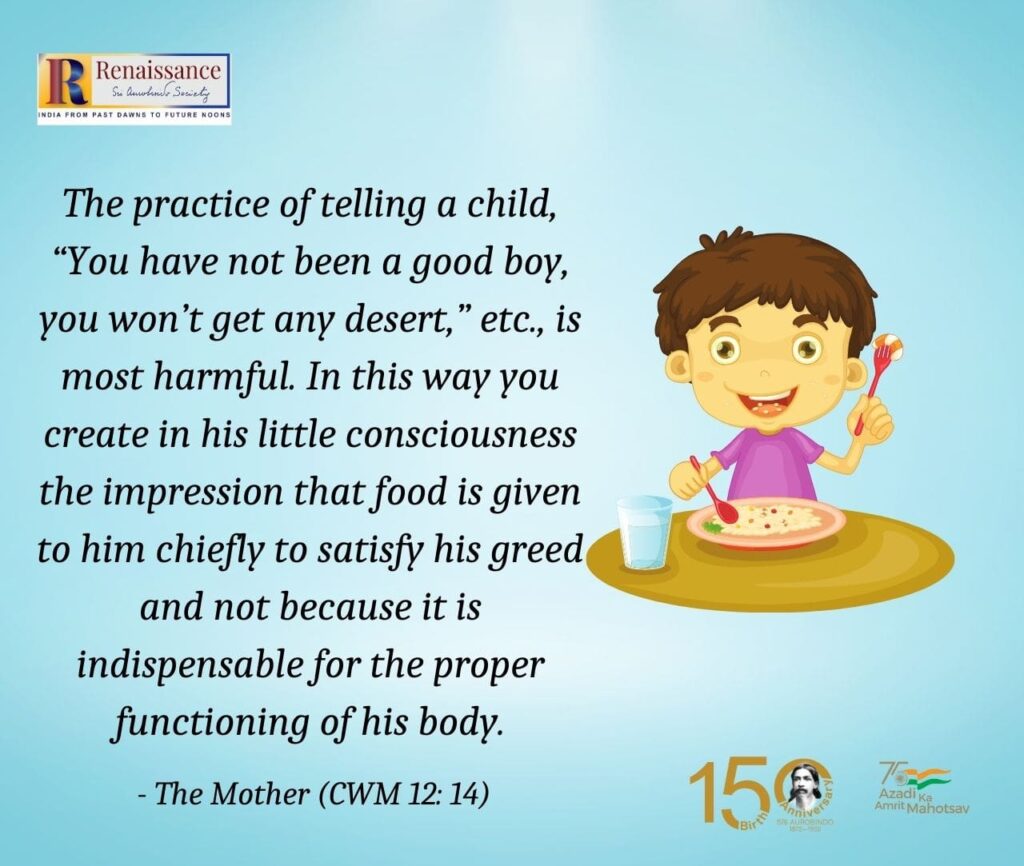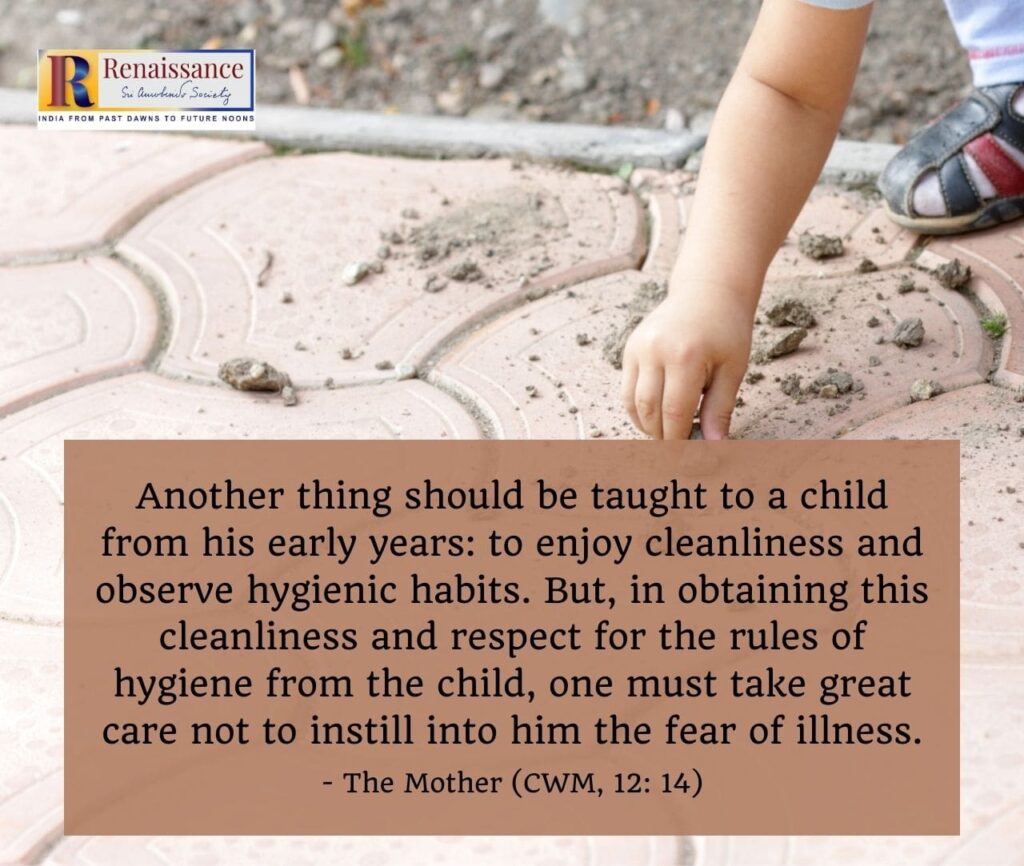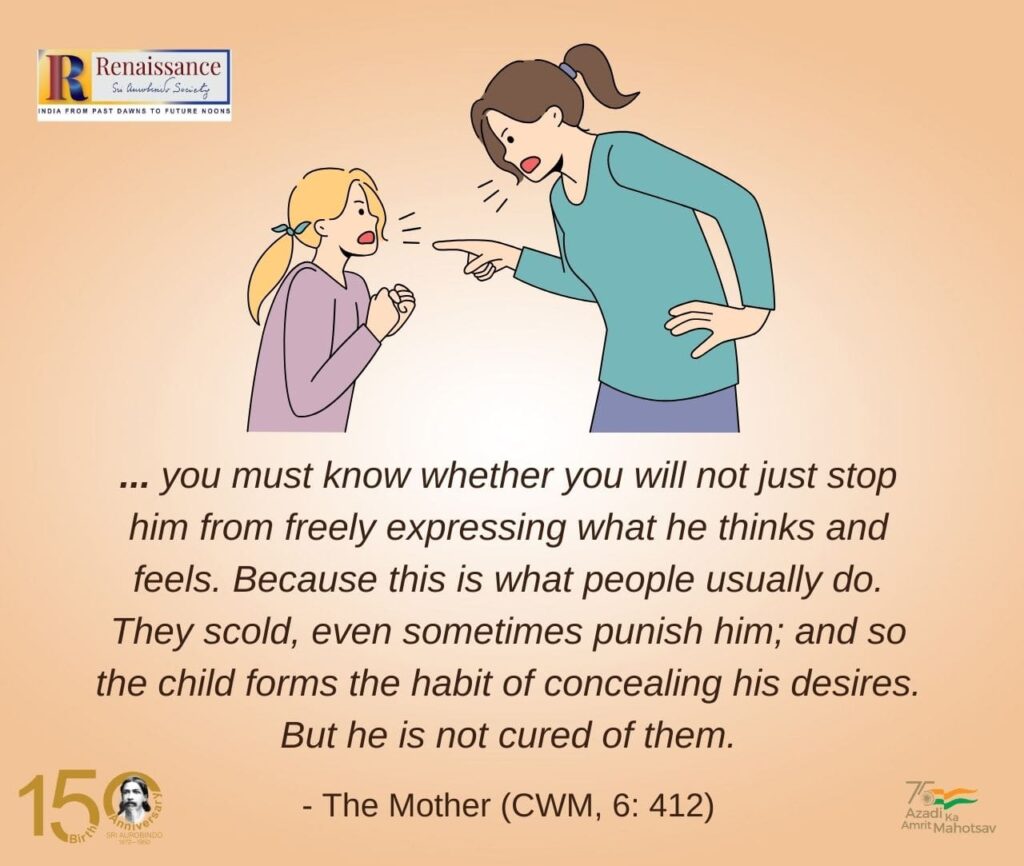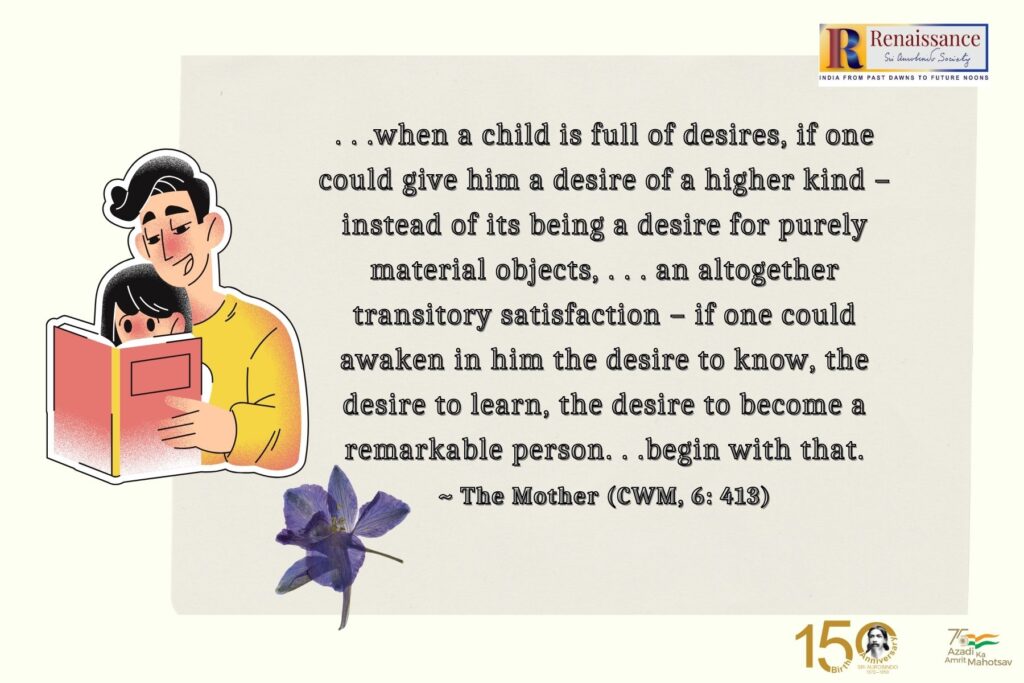Editor’s Note: For the ‘Book of the Month’ we feature a book titled ‘How to Bring Up a Child’ which is a compilation of practical guidance on parenting given by the Mother and Sri Aurobindo. The book, published by Sri Aurobindo Society, Pondicherry, also includes a few additional essays by other authors.
We highlight a few excerpts from this book which speak of cultivating right habits in the children with regard to daily life such as diet, sleep, hygiene etc. Interested readers can purchase the book through Auropublications.

Food and the body’s needs
The question of food has been studied at length and in detail; the diet that helps children in their growth is generally known and it may be very useful to follow it. But it is very important to remember that the instinct of the body, so long as it remains intact, is more reliable than any theory.
Accordingly, those who want their child to develop normally should not force him to eat food which he finds distasteful, for most often the body possesses a sure instinct as to what is harmful to it, unless the child is particularly capricious.
The body in its normal state, that is to say, when there is no intervention of mental notions or vital impulses, also knows very well what is good and necessary for it; but for this to be effective in practice, one must educate the child with care and teach him to distinguish his desires from his needs. He should be helped to develop a taste for food that is simple and healthy, substantial and appetizing, but free from any useless complications.
In his daily food, all that merely stuffs and causes heaviness should be avoided; and above all, he must be taught to eat according to his hunger, neither more nor less, and not to make his meals an occasion to satisfy his greed or gluttony.
From one’s very childhood, one should know that one eats in order to give strength and health to the body and not to enjoy the pleasures of the palate.
Children should be given food that suits their temperament, prepared in a way that ensures hygiene and cleanliness, that is pleasant to the taste and yet very simple. This food should be chosen and apportioned according to the age of the child and his regular activities. It should contain all the chemical and dynamic elements that are necessary for his development and the balanced growth of every part of his body.
Since the child will be given only the food that helps to keep him healthy and provide him with the energy he needs, one must be very careful not to use food as a means of coercion and punishment. The practice of telling a child, “You have not been a good boy, you won’t get any desert,” etc., is most harmful. In this way you create in his little consciousness the impression that food is given to him chiefly to satisfy his greed and not because it is indispensable for the proper functioning of his body.
– The Mother (CWM, Vol. 12, pp. 13-14)

Importance of sleep
A child, whatever his activities, should have a sufficient number of hours of sleep. The number will vary according to his age. In the cradle, the baby should sleep longer than he remains awake. The number of hours of sleep will diminish as the child grows. But until maturity it should not be less than eight hours, in a quiet, well-ventilated place. The child should never be made to stay up late for no reason.
The hours before midnight are the best for resting the nerves. Even during the waking hours, relaxation is indispensable for all who want to maintain their nervous balance.
To know how to relax the muscles and the nerves is an art which should be taught to children when they are very young.
There are many parents who, on the contrary, push their child to constant activity. When the child remains quiet, they imagine that he is ill. There are even parents who have the bad habit of making their child do household work at the expense of his rest and relaxation. Nothing is worse for a developing nervous system, which cannot stand the strain of too continuous an effort or of an activity that is imposed upon it and not freely chosen.
At the risk of going against many current ideas and ruffling many prejudices, I hold that it is not fair to demand service from a child, as if it were his duty to serve his parents. The contrary would be more true, and certainly it is natural that parents should serve their child or at least take great care of him.
It is only if a child chooses freely to work for his family and does this work as play that the thing is admissible. And even then, one must be careful that it in no way diminishes the hours of rest that are absolutely indispensable for his body to function properly.
– The Mother (CWM, Vol. 12, pp. 15-16)
* * *
Question: Sometimes, Mother, when children are interested in something, they don’t want to go to bed, then what should be done? Just a few minutes earlier they said they were sleepy, and then they start playing and say they don’t want to go to bed.
The Mother: They shouldn’t be allowed to play when they are sleepy. This is exactly the intrusion of vital movements. A child who doesn’t live much with older people (it is bad for children to live much among older people), a child left to itself will sleep spontaneously whatever it may be doing, the moment it needs to sleep. Only, when children are used to living with older people, well they catch all the habits of the grown-ups.
Specially when they are told: “Oh! You can’t do this because you are young! When you are older, you can do it. You can’t eat this because you are small, when you are bigger you will be able to eat it. At this particular time you must go to bed because you are young….” So, naturally, they have that idea that they must grow up at any cost or at least look grown-up!
– The Mother (CWM, Vol. 5, pp. 295)

Read:
Sri Aurobindo on Parenting and Education in Subjective Age
Respect Health and Cleanliness
Another thing should be taught to a child from his early years: to enjoy cleanliness and observe hygienic habits. But, in obtaining this cleanliness and respect for the rules of hygiene from the child, one must take great care not to instill into him the fear of illness. Fear is the worst instrument of education and the surest way of attracting what is feared.
Yet, while there should be no fear of illness, there should be no inclination for it either. There is a prevalent belief that brilliant minds are found in weak bodies. This is a delusion and has no basis. There was perhaps time when a romantic and morbid taste for physical unbalance pre-vailed; but fortunately, that tendency has disappeared. Nowadays a well-built, robust, muscular, strong and well-balanced body is appreciated at its true value.
In any case, children should be taught to respect health and admire the healthy man whose vigorous body knows how to repel attacks of illness.
Often a child feigns illness to avoid some troublesome obligation, a work that does not interest him, or simply to soften his parents’ hearts and get them to satisfy some caprice. The child must be taught as early as possible that this does not work and that he does not become more interesting by being ill, but rather the contrary.
The weak have a tendency to believe that their weakness makes them particularly interesting and to use this weakness and if necessary even illness as a means of attracting the attention and sympathy of the people around them. On no account should this pernicious tendency be encouraged.
Children should therefore be taught that to be ill is a sign of weakness and inferiority, not of some virtue or sacrifice.
– The Mother (CWM, Vol. 12, pp. 14-15)

When Children cry for things
Question: Sweet Mother, why do some children have the habit of always asking for things? Material things, like sweets, everything they see…
The Mother: Oh, because they are full of desires. They were probably formed with vibrations of desires, and as they have no control over themselves it is expressed freely. Older people are also full of desires, but usually they have a kind of…how do we call it? They are a little shy of showing their desires or they feel a bit ashamed or perhaps are afraid they will be laughed at; so they don’t show them. Well, they too are full of desires.
Only children are more simple. When they want something they say so. They don’t tell themselves that perhaps it would be wiser not to show this, because they don’t yet have this kind of reasoning. But I think, generally speaking, with very few exceptions, that people live in perpetual desires. Only, they don’t express them, and sometimes they are ashamed also to acknowledge it to themselves.
But it is there, this need of having something. . . you know, one something pretty, it is immediately translated into a desire for possession; and this is one of the things . . . it is absolutely childish. It is childish and indeed it is ridiculous, because at least ninety times out of a hundred, when the one who had a desire for something possesses it, he doesn’t even look at it any longer. It is very rarely that this thing continues to interest him once he has it, whatever the nature of the object.
Question: Sweet Mother, how can we help a child to come out of this habit of always asking?
There are many ways. But first of all you must know whether you will not just stop him from freely expressing what he thinks and feels. Because this is what people usually do. They scold, even sometimes punish him; and so the child forms the habit of concealing his desires. But he is not cured of them.
And you see, if he is always told, “No, you won’t have that”, then, simply, this state of mind gets settled in him: “Ah, when you are small, people don’t give you anything! You must wait you are big. When I am big I shall have all that I want.” That’s how it is. But this does not cure them.

It is very difficult to bring up a child. There is a way which consists in giving him all he wants; and naturally, the next minute he will want something else, because that’s the law, the law of desire: never to be satisfied.
And so, if he is intelligent, one can tell him, “But you see, you insisted so much on having this and now you longer care for it. You want something else.” Yet if he was very clever he would answer, “Well, the best way of curing me is to give me what I ask for.”
Some people cherish this idea all their life. When they are told they should overcome their desires, they say, “The easiest way is to satisfy them.” This kind of logic seems impeccable. But the fact is that it is not the object desired that has to be changed, it is the impulse of desire, the movement of desire. And for this a great deal of knowledge is needed, and this is difficult for a very young child.
It is difficult. Indeed, they don’t have the capacity for reasoning: one can’t explain things to them, because they don’t understand the reasons. So you see, when it is like that the parents usually tell the child, “Keep quiet, you are a nuisance!” In this way they get out of the difficulty. But this is no solution. It is very difficult. It asks for a sustained effort and an unshakable patience.
Some people are like that all their life; they are like babies throughout their existence and it is impossible to make them see reason. As soon as one tells them that they are not reasonable and that one can’t all the time be giving them things to satisfy their desires they simply think, “These people are unpleasant. This person is not nice.” That’s all.
In fact, perhaps one should begin by shifting the movement to things which it is better to have from the true point of view, and which it is more difficult to obtain. If one could turn this impulsion of desire towards a. . .
For example, when a child is full of desires, if one could give him a desire of a higher kind – instead of its being a desire for purely material objects, you understand, an altogether transitory satisfaction – if one could awaken in him the desire to know, the desire to learn, the desire to become a remarkable person… in this way, begin with that. As these things are difficult to do, so gradually, he will develop his will for these things.

Or even, from the material point of view, the desire to do something difficult, as for example, construct a toy which it is difficult to make – or give him a game of patience which requires a great deal of perseverance.
If one can orient them – it requires much discernment, much patience, but it can be done – and if one can orient them towards something like this, to succeed in very difficult games or to work out something which requires much care and attention, and can push them in some line like this so that it exercises a persevering will in them, then this can have results: turn their attention away from certain things and towards others.
This needs constant care and it seems to be a way that’s most – I can’t say the easiest, for it is certainly not easy – but the most effective way. To say “No” does not cure and to say “Yes” does not cure either; and sometimes it becomes extremely difficult also, naturally.
Also Read: Kunti – A Paradigm of Conscious Parenting
I knew people, for example, whose children wanted to eat everything they saw. They were allowed to do it. So they fell very ill. After that, they felt disgusted. But this is a little risky, isn’t it? There are children who fidget with everything. Now, one day, you see, one child got hold of a box of matches. Then, instead of telling him, “Don’t touch it”, They let him do it: he burnt himself. He never touched them again.
But it is a little dangerous, because some children are altogether unconscious and very bold in their desires: for example, those who like to walk on the edge of a wall or the top of a roof or have the desire to plunge into water when they see it or to dive into a river…you see, this becomes sometimes very difficult… or those who have the mania for crossing the street: Each time they see a car coming… they try to cross it. So if they are allowed to do so, the experience may one day be fatal…
Probably, one needs to find a middle term between the two, between the two extremes: that of watching over him all the time and that of leaving him absolutely free to do what he likes, without even warning him against the accidents which are likely to occur. An adjustment to make every minute! Difficult.
– The Mother (CWM, Vol. 6, pp. 410-415)

To purchase the book,
click HERE.

~ Design: Raamkumar



